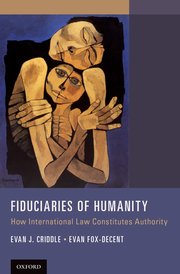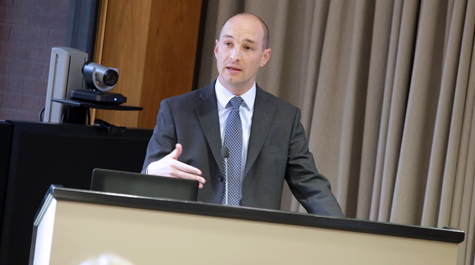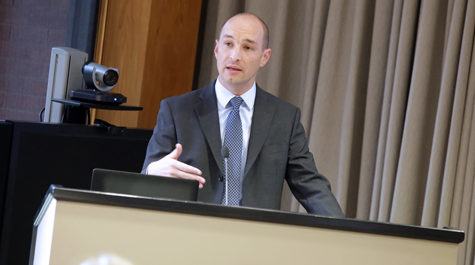“Fiduciaries of Humanity”: Professors Criddle and Fox-Decent Explore Fundamental Shift in International Law in New Book
Professor Evan J. Criddle recently delivered the Law School’s annual St. George Tucker Lecture. In his remarks, Criddle introduced his newly published book with co-author Professor Evan Fox-Decent of McGill University, Fiduciaries of Humanity: How International Law Constitutes Authority (Oxford University Press).
 “Fiduciaries of Humanity” explains a fundamental shift in international law. A century ago, international law assumed that states held sovereignty as an absolute legal right, with an entitlement to govern their people domestically and represent their people internationally free from external interference. Today, this conception of sovereignty no longer commands general acceptance. Instead, international law has embraced a new paradigm in which all states are understood to bear legal obligations that regulate their relationship with their people and foreign nationals. A state’s claim to sovereignty is dependent on its compliance with a variety of non-negotiable legal obligations. Some of these obligations, such as the international prohibitions against military aggression and torture, bind all states, irrespective of whether the states have given their consent.
“Fiduciaries of Humanity” explains a fundamental shift in international law. A century ago, international law assumed that states held sovereignty as an absolute legal right, with an entitlement to govern their people domestically and represent their people internationally free from external interference. Today, this conception of sovereignty no longer commands general acceptance. Instead, international law has embraced a new paradigm in which all states are understood to bear legal obligations that regulate their relationship with their people and foreign nationals. A state’s claim to sovereignty is dependent on its compliance with a variety of non-negotiable legal obligations. Some of these obligations, such as the international prohibitions against military aggression and torture, bind all states, irrespective of whether the states have given their consent.
Criddle and Fox-Decent argue that these developments reflect a redefinition of the very concept of sovereignty. Under international law today, they suggest, states receive sovereignty in a fiduciary capacity as trustees for their own nationals and foreign nationals who are subject to their jurisdiction. International institutions also serve as fiduciaries of humanity and are subject to fiduciary obligations similar to those of states. In contrast to the receding model of absolute sovereignty, which assumes an abiding tension between sovereignty and principles of state responsibility, the fiduciary theory explains how a state’s obligations to its people are part and parcel of its legal authority under international law.
In his Tucker Lecture, Criddle explored how these themes from Fiduciaries of Humanity would apply to the current Syrian refugee crisis. He argued in particular that the fiduciary theory of sovereignty explains why states such as Jordan, Lebanon, and Turkey are obligated under international law to admit Syrian refugees who arrive at their borders. Although none of these states are full parties to treaties that require protection for Syrian refugees, as fiduciaries of humanity they lack authority to forcibly repulse refugees who would face a well-founded fear of persecution in Syria. Accordingly, protection for Syrian refugees is not merely a matter of sovereign grace or discretion, but rather a genuine legal obligation that reflects the fiduciary character of sovereignty under international law.
Criddle's body of scholarship includes 22 articles in American and international law journals and six book chapters. In addition to Fiduciaries of Humanity, he is the editor of Human Rights in Emergencies (Cambridge University Press).
About William & Mary Law School
Thomas Jefferson founded William & Mary Law School in 1779 to train leaders for the new nation. Now in its third century, America's oldest law school continues its historic mission of educating citizen lawyers who are prepared both to lead and to serve.




